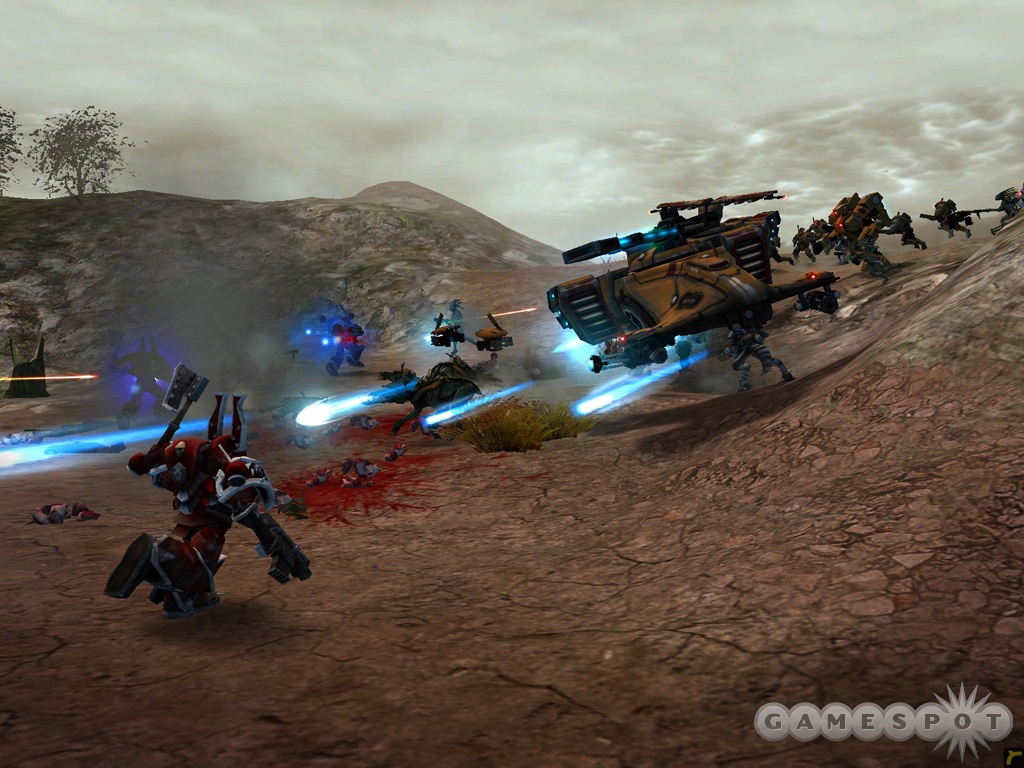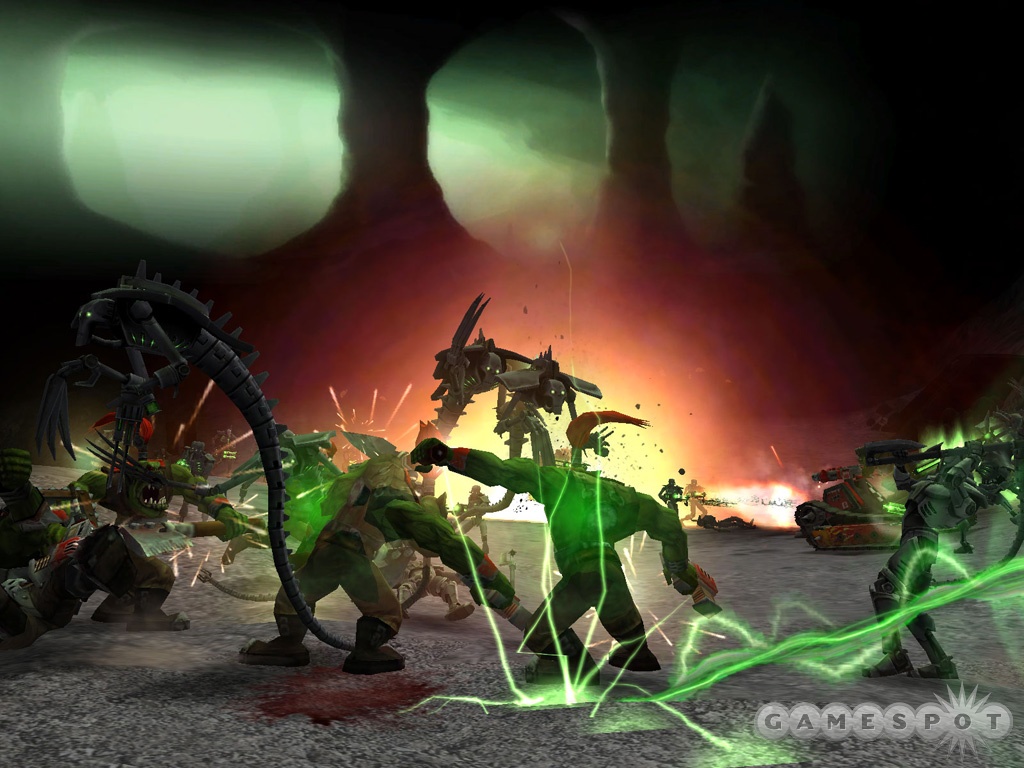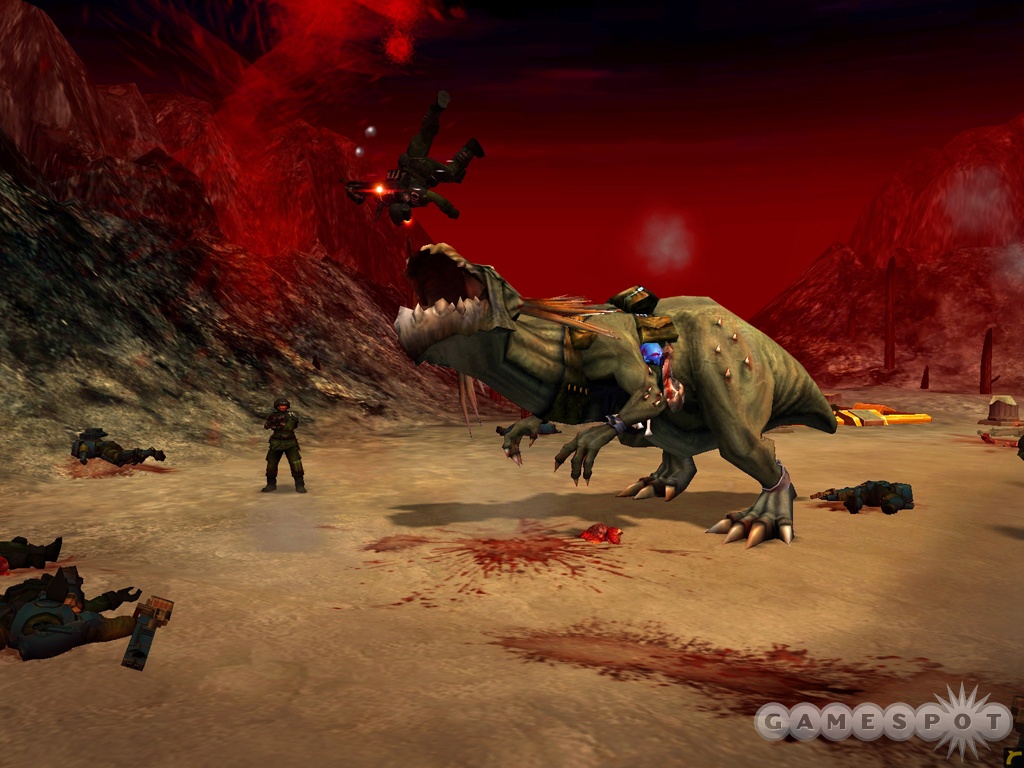Warhammer: 40,000: Dawn of War: Dark Crusade Exclusive Hands-On
This stand-alone expansion will add two new races and a turn-based strategy layer to the popular Dawn of War formula.
While Relic's superb Company of Heroes is currently the talk of the strategy genre, the company hasn't forgotten about its acclaimed Warhammer: 40,000 series, either. Relic is currently putting the finishing touches on Warhammer: 40,000: Dawn of War: Dark Crusade, the second expansion to the hit 2004 real-time strategy game set in the brutal Warhammer 40,000 sci-fi universe. Dark Crusade packs a lot of content for an expansion pack, and it introduces a number of new features, not the least of which is a turn-based strategic layer to the campaign game. We played around with a work-in-progress version of Dark Crusade to see just how these new features are coming together.

Dawn of War's success can be attributed to the fact that it captured the violent nature of Warhammer 40,000 combat and set it in a challenging real-time strategy environment where capturing territory was just as important as base and unit building. The game featured four playable races in the form of the space marines, the orks, the eldar, and the chaos space marines, while the Winter Assault expansion introduced the Imperial Guard. Dark Crusade introduces two new races, boosting the total to seven. If you don't own Winter Assault or even Dawn of War, don't worry--the expansion packs all seven races in it. New here are the necrons, an undead army, and the tau, an almost mechanized race that uses seemingly anime-inspired battle suits. However, all the existing races get new units, as well, so there's something for everyone in Dark Crusade.
The significant new addition in Dark Crusade, though, is certainly the strategic campaign. Turn-based campaign layers in real-time strategy games are becoming more and more popular, since the strategic layer can make the real-time battles more meaningful, as there's something at stake besides simply crushing the other guy on a battlefield. The ultimate goal in Dark Crusade's campaign is to conquer the planet Kronus, and you begin with just a single territory, which is home to your stronghold. Every turn, you must decide where you want your army to attack next. Win and you seize that territory, but lose and you'll be rebuffed that turn. If you ever lose your stronghold territory, you lose the campaign. On the flip side, that also means that you don't have to conquer every territory. By fighting to capture enemy strongholds, the gameplay focus will be on these strategic locations, so the game shouldn't get bogged down in a long campaign to conquer the entire map.
There's a lot more to the campaign than just worrying about strongholds, though, as there are plenty of strategic implications on the map that may affect your war. Territories are rated by military strength, so it's wise to avoid heavily defended territories until you can build up your military forces and your strength. Meanwhile, some territories convey strategic advantages to whichever faction owns them. Possessing the Eres Badlands, for instance, gives you control of the chaos god's relic, which lets you launch two attacks per turn, where before you were limited to only one. Or, gaining Pavonis gives you control of the planet's space port, letting you use transports to leapfrog and attack any territory, even those that aren't adjacent to your borders, though you can't use it to attack strongholds. These bonuses can make non-stronghold territories a tempting target.

Other territories will let you recruit honor guard, which are elite units that can accompany your commander from battle to battle, ensuring that you don't have to start from scratch and build up an army every time you invade a territory. You're only allowed one army on the map, as well, since armies are centered around your unique commanders, so the makeup of this army becomes even more important. The challenge is that all units use up planetary requisition points, so you have a population cap that limits the size of your honor guard, as well as the units that you use to garrison territory. Do you spend requisition points on defending an important territory or to bulk up your commander's army? It's your call.
Your commander is a powerful unit in the campaign, and you can outfit him with a variety of war gear, which consist of weapons and equipment that you earn through conquest. Whenever you're rewarded for your performance, you can purchase a piece of war gear that's unique to that commander's faction. So the necron lord can earn a reinforced body of living metal, making him tougher in combat, or a death shroud, which increases his speed and reduces damage from attacks. On the other hand, the tau commander can be equipped with missile pods, a jetpack, or even a shield drone that draws enemy fire away from him. Each commander has up to 10 potential unlockables, so you can tailor the war gear selections to your style of play, be it offensive or defensive. These selections also change your commander's appearance, so the more war gear you unlock, the more powerful the commander looks on the battlefield.
The battles remain as visceral and fast-paced as ever, and the focus remains on capturing and holding strategic points that are dotted across the map. Possessing a strategic point generates requisition points, which is one of the two primary resources in the game, and this means that, once again, you can't afford to "turtle up" in a base and build up an army. If you do so, you'll be crushed by the other team. Instead, you must venture out early and capture and defend as many strategic points as possible, shifting forces around the map, since you can't build a large enough army to defend every point equally. The artificial intelligence looks like it'll keep you on your toes, though, as we saw the computer adapt to our tactics quickly. After trying to attack us with a large force, it switched tactics and employed hit-and-run attacks and stealth units to try and whittle us down. It's rare to see an AI actually respond correctly to what you're doing to it.

Since Dawn of War's release two years ago, Relic has diligently balanced the gameplay through patches and updates, and the payoff is that the core gameplay is sharper than ever at this point. Still, whenever you introduce two new armies and new units, there's always a risk of unbalancing the sides, but from what we've seen so far, both the tau and the necron feel like solid additions to the game. The tau are the mechanical faction, from the mechanized battle suits to the way tau structures are bolted into the ground. The necron, on the other hand, display an appropriately morbid look for an undead faction. The necron structures rise out of the ground and appear as sinister memorials, almost like tombstones.
Aside from the new turn-based campaign, the familiar skirmish and multiplayer options remain about the same, though there are a dizzying number of skirmish and multiplayer maps at this point. We lost count at more than 60, but that should provide plenty of replay fodder whether you battle the AI or other players in multiplayer. The rules are fairly customizable, and you can play to assassinate one another's commanders, destroy each other's headquarters, play for an economic victory, and more.
There's simply an impressive amount of content in Dark Crusade, and this is almost a whole new game. The turn-based campaign changes the way you play Dawn of War. No longer will you have to go from mission to mission in a scripted, linear campaign, but you will be able to decide your own fate, and that should appeal to the many Dawn of War fans out there. The fact that the expansion is stand-alone should also make it accessible to newcomers, as they won't need to worry about owning the original Dawn of War to play it. Relic looks like it has another promising strategy game on its hands, and coming on the heels of Company of Heroes, the studio could very well be on a hot streak. Dark Crusade will ship in October.
Got a news tip or want to contact us directly? Email news@gamespot.com
Join the conversation